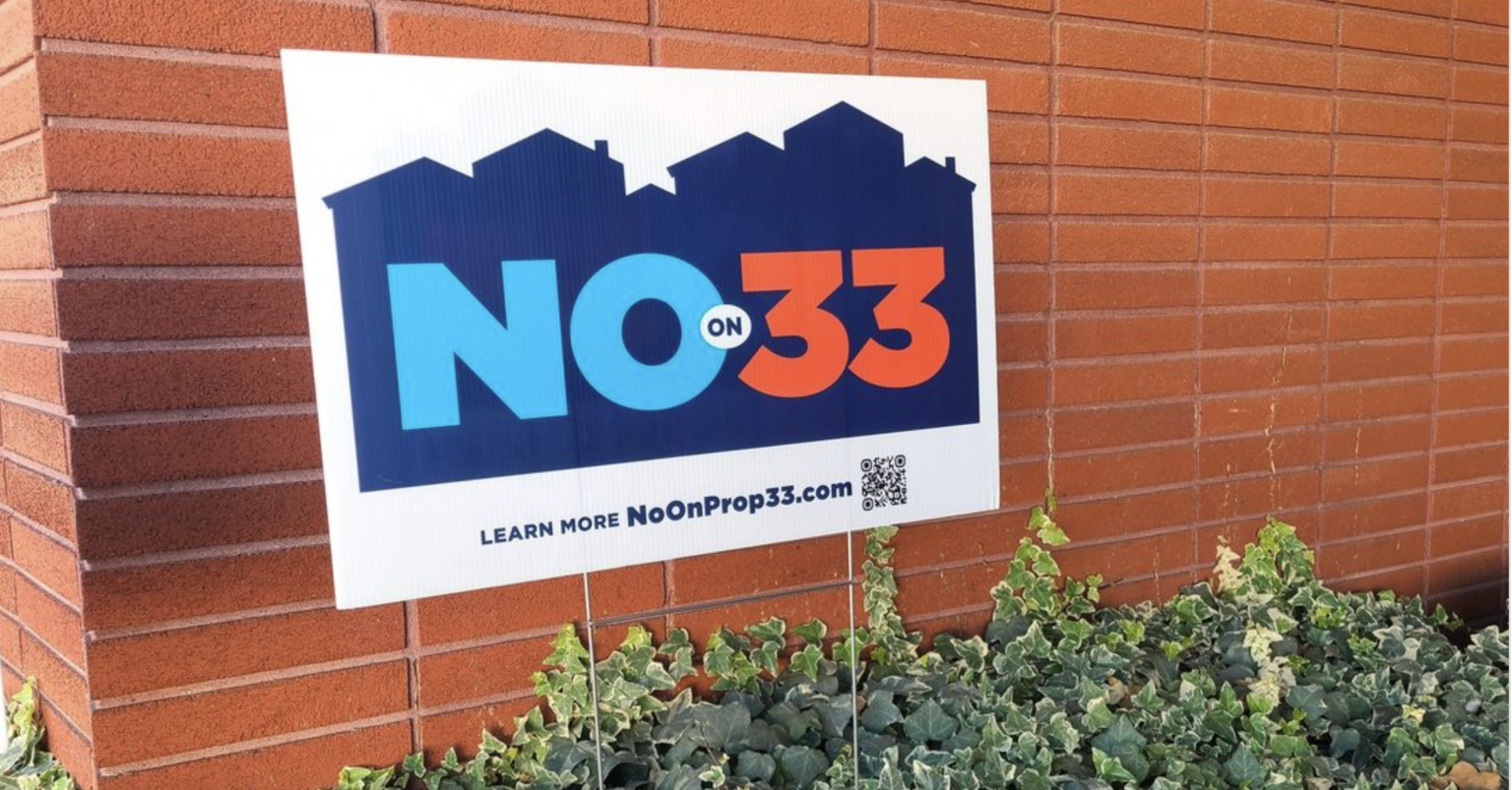Californians have once again said no to allowing local government to impose rent control. After weeks of aggressive campaign ads by the proponents and opponents of Prop 33, Californians hit the polls and cast their votes.
For the third time in recent years, Californians rejected allowing city governments to expand rent control.
Prop 33 would have repealed the Costa Hawkins Rental Housing Act, a 1995 bill that took rent price setting powers for vacant units, single-family homes and apartments built after Feb.1, 1995, out of the hands of local governments. Prop 33 did not seek to modify rent control in any town. Rather, it aimed to repeal a state-level law.
California is currently experiencing a housing shortage and one of the highest rates of homelessness, with high rental prices and low housing availability.
Since 1970, new building construction has failed to keep up with demand. Adding to the complexity of the housing crisis are zoning regulations and the rising cost of labor and materials. In response, developers have focused on building high-end housing that provides a better return on investments, increasing the shortage of affordable housing options.
According to the California Voters Guide, the fiscal impact of Prop 33 would have been a decrease in local property tax receipts of at least tens of millions of dollars per year. The guide also says Prop 33 would likely cause a drop in property values in some communities.
According to Google’s live tracker, 60.6% of 12,409,762 voted no on Prop 33, with 39.4% voting for yes.
One of Prop 33’s major supporters was the Los Angeles-based AIDS Healthcare Foundation. The nonprofit had attempted two similar state ballot motions in 2018 and 2020, though both were rejected by voters.
The organization contributed more than $16 million to Prop 33’s and dubbed it the “Justice for Renters Act.” They argue that due to landlords’ setting rent prices, tenants are at risk of being displaced, exacerbating California’s growing population of homeless people.
The California Nurses Association, California Alliance for Retired Americans, the Coalition for Economic Survival, TenantsTogether, and the Los Angeles and San Francisco Counties were proponents of the act.
They raised a total of $50.1 million in support the Yes on 33 campaign and challenged their opponents’ assertions that the proposition would worsen the housing situation.
“There are more people who are rent-burdened in California than anywhere in the entire country,” Susie Shannon says. “We’re losing our affordable housing…this will actually preserve affordable housing. This will preserve those rent-controlled units for people who need them, like seniors on a fixed income…the status quo isn’t working.”
The victors of Prop 33’s failure are landlords, property owners, the California Council for Affordable Housing, the Women Veterans Alliance, the California Chamber of Commerce, the California Association of Realtors, the San Francisco Apartment Association, and the NAACP California/Hawaii State Conference. No on 33 raised over $120 million for its campaigning efforts.
“California rejected twice before by 60%. They understand that this will make our housing crisis worse, it will make our homelessness worse,” No on 33 spokesperson Nathan Click says. “We need to build more housing.”
Opponents argued that government interference in the price of rent would discourage developers from building new homes and that the value of existing homes would fall, causing a shortage of new homes driving housing and rent prices up.
Another issue that proved controversial was the heavy involvement of the AHF. Last year, the organization was the subject of a Los Angeles Times investigation revealing the non-profit acted as a landlord whose tenants were “living in squalor.”
The organization recently settled a class-action lawsuit with tenants who accuse the organization of”failing to maintain working water and power,” “refusing to make repairs,” and “allowing known, severe safety hazards to persist unabated” among a host of other allegations.
“With all of the public money Michael Weinstein (President of the AHF) has wasted on his latest crusade to stop new affordable housing, AHF could have purchased more than 820,000 monthly doses of generic PrEP, paid the rent for 15,000 California households for a year, or repaired hundreds of times over its broken open elevator shaft in one of its many dilapidated properties, where low-income residents live in squalor,” Tom Bannon said, chief executive officer of California Apartment Association (CAA) said in a press release following Prop 33’s failure.
Landlords and the CAA took it a step further by also sponsoring Prop 34, which restricts the spending of prescription revenues, which comprises nearly 90% of the AHF’s revenue.
Prop 34 seeks to regulate how healthcare providers spend revenues from a federal prescription drug program. Prop 34 requires that certain providers spend 98% of their revenue on direct patient care.
As of Wednesday, the votes tally with 50.8% of 12,034,110 people voting yes so far.
The final results will be revealed when the election is certified on December 13.
Related: The 10 Worst Cities for Renters in the U.S.
Any views or opinions expressed are solely for informational purposes and do not reflect support or opposition to any political party, organization, or individual involved.


